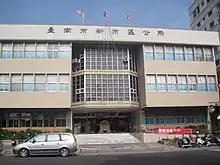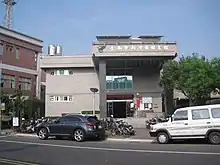Sinshih District
Sinshih District[1][2][3][4][5][6] (Chinese: 新市區; Hanyu Pinyin: Xīnshì Qū; Tongyong Pinyin: Sinshìh Cyu; Wade–Giles: Hsin1-shih4 Ch'ü1; Pe̍h-ōe-jī: Sin-chhī-khu; lit. 'new market'), alternatively spelled Xinshi, is a rural district in central Tainan, Taiwan, about 11 km north of Fort Provintia. As Sincan, it was one of the most important stations of the Dutch East India Company (VOC) in the 17th century. Missionary work formally began and the largest amount of inland trade occurred at Sinkan.
Sinshih
新市區 Xinshi; Hsin Shih | |
|---|---|
 View from Tainan Science Park in Sinshih District | |
|
臺南市新市區公所 Sinshih District Office, Tainan City | |
 Sinshih District in Tainan City | |
| Location | Tainan, Taiwan[1] |
| Area | |
| • Total | 48 km2 (19 sq mi) |
| Population (May 2022) | |
| • Total | 37,435 |
| • Density | 780/km2 (2,000/sq mi) |
| Website | www |


Name
The village name of Sincan has also been recorded as Sinckan, Cinckan, Xincan, and Zinckan.[7] The place shares the same namesake as the Sinckan language and Sinckan Manuscripts. After the Kingdom of Tungning, the name was Sinicized into Sin-kang (Chinese: 新港; pinyin: Xingang; Pe̍h-ōe-jī: Sin-káng; lit. 'new harbor/new inlet').
History
Located about 7 miles (11 km) north of Sakam (see Fort Provintia), Sinkan was one of the most important stations of the Dutch during the 17th century. Sinkan was the smallest of four main aboriginal villages near the Dutch base at Tayouan, with around 1,000 inhabitants.[8] This fact led them to seek friendship and protection from the Dutch; Sinkan was the VOC's closest ally.
In 1861 Consul Robert Swinhoe arrived at Taiwan-fu (modern-day Tainan) and became the first European writer to come into contact with the Taiwanese aborigines after Maurice Benyovszky in 1771.[9] Swinhoe wrote that he was informed by a "thoroughly Chinese-looking" military officer that his ancestor was one of 3,000 Dutch soldiers remaining in the island during the reign of Koxinga (and after Dutch rule), and that his village of Sinkang was chiefly composed of the soldiers' descendants.
Sinshih Township was created in 1945 as part of Sinhua District, Tainan County. In 1946, Sinshih Township was transferred to direct administration by Tainan County and in July, the villages of Dashe and Tanding, originally part of Shanshang, were transferred to the administration of Sinshih Township.[2]
The former Sinshih District Office at No. 3, Jhongsing Street was demolished in 1983. The current Sinshih District Office at No. 12, Jhongsing Street was completed in March 1984.[2]
On December 25, 2010, Tainan City and County were merged. At the same time, Sinshih Township was renamed as Sinshih District.[2]
In May 2019, the Taiwan Power Company announced plans to build a large solar energy power facility in Tainan. At that time, the Tainan city government had recently finished a bidding process to determine contracts in several areas including Sinshih District for roof-top solar power generation.[4]
Geography
- Area: 49.51 km2
- Population: 35,883 people (January 2016)
Administrative divisions
The district consists of Xinshi, Xinhe, Shenei, Dazhou, Fenghua, Sanshe, Daying, Dashe,[2] Tanding,[2] Gangqi and Yongjiu Village.[10]
Economy
Part of Tainan Science Park, which was founded in 1996, lies within Sinshih.
Education
Tourist attractions
- Museum of Archaeology, Tainan Branch of National Museum of Prehistory
- Dashe Folk Culture Museum
- Daying Couple Tree
- Sincan Tribe Museum
- Zhang Family Mansion[11]
Transportation
See also
References
- "District Office". Tainan City Government Global Website. 2016-06-03. Retrieved 23 July 2019.
Sinshih District Office
- "About us INTRODUCING THE DISTRICT OFFICE". Sinshih District Office, Tainan City. Retrieved 24 July 2019.
On December 25, 2010, Taipei County, Taichung County (and City), Tainan County (and City), and Kaohsiung County (and City) were restructured and elevated to municipalities. Siang, Jhen, and Shih (townships and cit- ies) were renamed as districts while Cun was renamed as Li (Village). Sinshih Township was therefore renamed as Sinshih District.
- Sinshih (Variant - V) at GEOnet Names Server, United States National Geospatial-Intelligence Agency
- "Taipower to build nation's largest solar power facility in Tainan". Central News Agency. 22 May 2019. Retrieved 24 July 2019.
The city government just finished a bidding process to determine contracts in several areas such as Sinshih, West-central, Northern, Eastern, Southern, Anping and Annan districts for roof-top solar power generation, and total capacity is expected to reach 14,000 kilowatts, Hsu added.
- Chih-Chieh Lu; Jin-Hung Hwang; Shang-Yi Hsu (15 August 2017). "The impact evaluation of soil liquefaction on low-rise building in the Meinong earthquake". Earth, Planets and Space. 69 (1): 109. Bibcode:2017EP&S...69..109L. doi:10.1186/s40623-017-0693-4.
In this paper, the liquefaction evaluation mainly focuses on the two most severely damaged areas in the Annan and Sinshih Districts.
- 1.7-鄉鎮市區戶口數 [Population for Township and District]. Ministry of the Interior (in Chinese (Taiwan) and English). August 2020. Retrieved 21 September 2020.
新市區 Sinshih District 47.8096 13,169 37,567 18,803 18,764 100.21 2.85 786
- Campbell, William (1903). "Explanatory Notes". Formosa under the Dutch: described from contemporary records, with explanatory notes and a bibliography of the island. London: Kegan Paul. p. 547. ISBN 978-957-638-083-9. OCLC 644323041.
- Andrade, Tonio (2005). "Chapter 3: Pax Hollandica". How Taiwan Became Chinese: Dutch, Spanish, and Han Colonization in the Seventeenth Century. Columbia University Press. §3.
- Campbell (1903), pp. 551–2.
- "2018 Local Elections". Archived from the original on 2018-12-05.
- "Sinshih Township". Tainan County Government. Retrieved 23 December 2014.
External links
- Official website
 (in Chinese)
(in Chinese)
